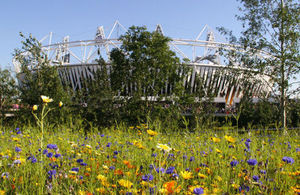London 2012 Olympic and Paralympic Games: inspiring sustainable living projects
How local environmental projects improved sustainability in East London.

Environmental projects in East London benefitted from funding as part of the sustainability legacy of the London 2012 Olympic and Paralympic Games.
The projects started in March 2011 and were completed by March this year.
Defra awarded grants to civil society and local community groups, BioRegional, East Potential, Groundwork and Sustrans to provide practical information, help and advice about sustainable living.
All of the projects encouraged people to adopt more sustainable lifestyles, from growing food to reducing energy to becoming more active by walking and cycling more.
Lord de Mauley, Resource Management Minister, said,
The Inspiring Sustainable Living projects will help to ensure the legacy of the Olympic Games extends beyond 2012. They have supported people in learning more about the environment, and given local communities in East London the information to help them reduce their energy, recycle more, grow food in an urban environment and promote cycling and walking.
BioRegional created two exhibitions, the One Planet Centre in the Olympic Park athletes village and the One Planet Experience based in Sutton. Both featured interactive multi-media exhibitions and were visited by over 4,200 people including international athletes.
In Newham, East Potential worked with local residents providing Green Homes resource packs, recruiting local volunteers to help run the projects and gave young people in sheltered accommodation the chance to learn more about growing food and eating healthily.
Groundwork created community gardens and green spaces from unused derelict local spaces, generating more than 20,000 hours of volunteering. Local people also attended waste and recycling workshops and over 60 community champions were trained.
Sustainable transport charity Sustrans used their funding to create a network of more than 290 volunteer champions to run various activities designed to get more people cycling and walking. More than 1,300 people took part in the Active Travel Challenge, logging their travel journeys and competing for prizes.
Our infographic on Facebook summarises some of the project highlights.